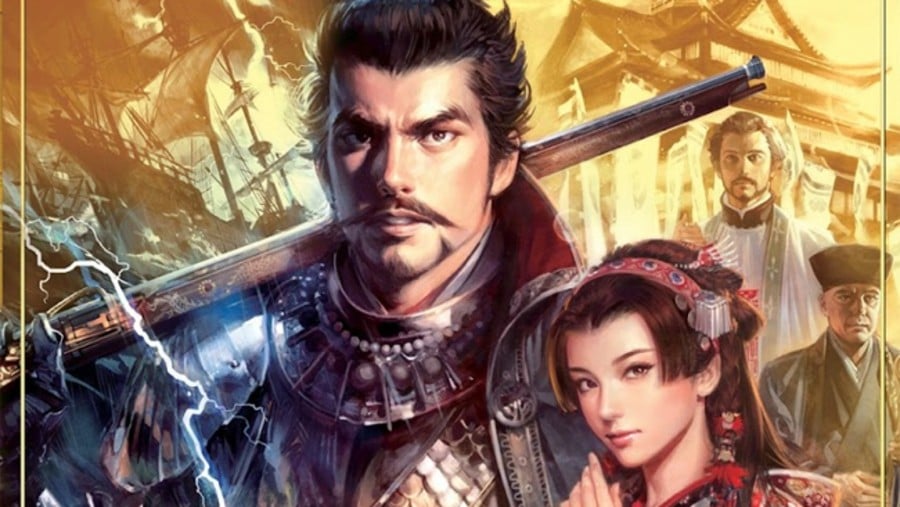
Nobunaga's Ambition: Sphere of Influence is out early next month on PlayStation 4 and PlayStation 3. The historical Japanese strategy series returns West after a particularly long break, and its newest entry promises to be packed with more tactical goodness than ever before. In order to learn more about the game itself, the new features that it brings to the franchise, and publisher Koei Tecmo's localisation efforts, we took the opportunity to chat with the title's producer, Kenichi Ogasawara.
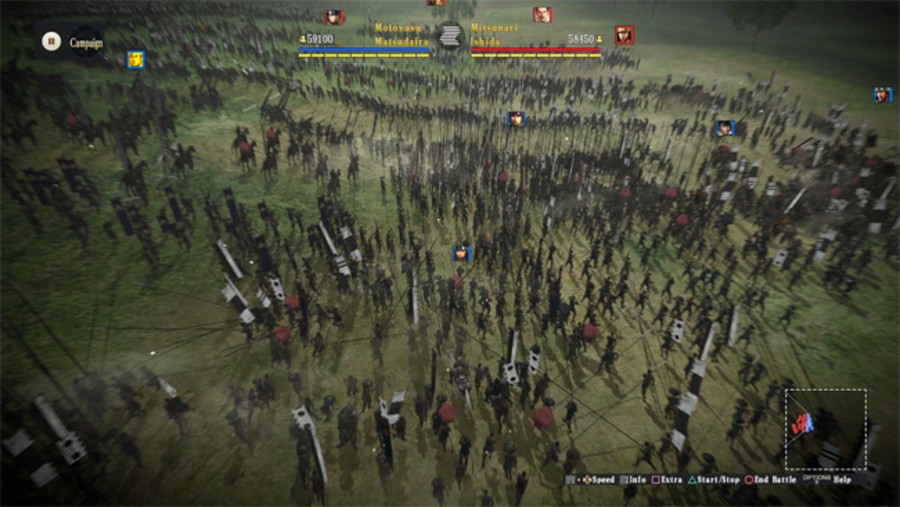
Push Square: Nobunaga's Ambition: Sphere of Influence marks the return of the series here in the West, so you must expect a lot of new players to try the franchise for the first time. How would you describe the game to those people?
Kenichi Ogasawara: It's not really true that the series hasn't been sold in the West. There were several parts of the series that were sold in the US, but not in Europe, but that was a long time ago. We think that with Sphere of Influence, which marks the 30 year anniversary of Nobunaga's Ambition along with 30 years of experience developing strategy games, we've built a strategy game system that Europe can enjoy without the knowledge of Japanese history. Of course, it's going to be more fun if you know the history, so you may want to educate yourself!
Nobunaga's Ambition is a much loved franchise that has a very long history. How do you think it's maintained its popularity for so long, especially in Japan?
Basically, the Japanese like this historic era of the Sengoku period; there are a lot of books about it, a lot of TV shows, animes, comics – and that's of course one big sales point for the series. The other reason is that the strategy game genre isn't that big, and there's not really much of a chance of anyone developing a strategy game again and again in different ways. But due to the big fanbase we have in Japan, we have the capital to redevelop each part of the series and switch the gaming and strategy systems to make each new game challenging, even for players of the old ones.
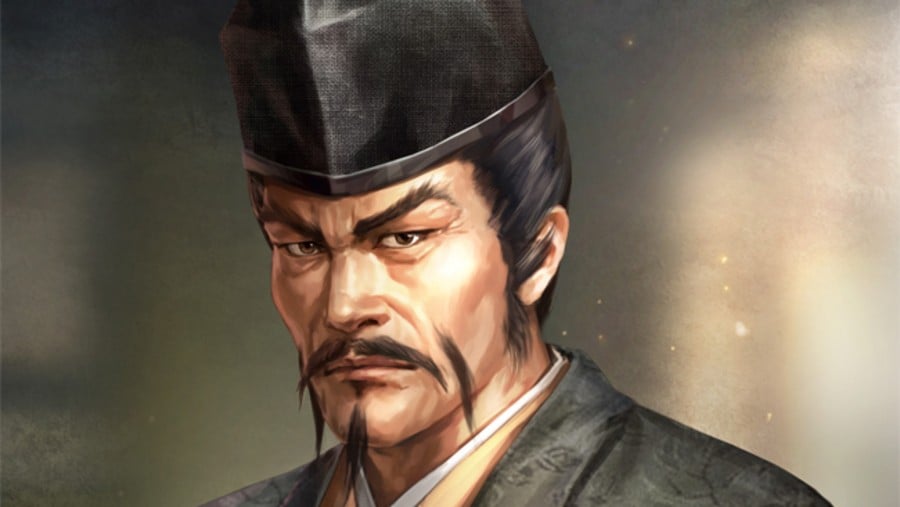
Japanese history is full of interesting figures - just like Nobunaga himself. Is it fun to create games based on these characters, and is it difficult to decide on how to portray each historical figure in the games?
Of course, it's challenging to portray historical figures, especially in Sphere of Influence, for example, as there are 200 historical figures portrayed within the game. But as this era is very popular in Japan, there are a lot of documentations about what happened in the era and how people were. We try to be as accurate as possible based on what we know. Also, over the last 30 years of Nobunaga's Ambition, there's always been new knowledge about the people and new historical facts popping up, and we are trying to put those in the game, too. This ensures that the historical figures are always portrayed based on the best knowledge we have of them at the time.
When it comes to the looks of the characters, there are old portraits, so this is a very well documented area, and we try to use as much of this material that we have. Of course, in terms of design, we have to modernise them a little bit, but all in all, it's our responsibility to show these characters as accurately as we can right now.
Sphere of Influence seems to be one of the most robust entries in the series to date. What new features are you most excited about?
In former entries in the series, the battlefield of Japan was divided into 50 states, and the [player] has to go and conquer it one state at a time. Now, with the new system, we have 300 castles instead of the states that have to be conquered, which allows for more strategy. This is because in Japan, 90 per cent of the land is mountains, so there's just 10 per cent of plain land that you can actually use as a road if you travel with an army. This makes the position of each castle much more important because if you section off parts of the roads, you can stop armies from several directions.
As each army is stationed in a certain castle, if you want to assemble your armies to seize a certain castle, you have to keep the travel distances in mind so each army arrives at the same time and can attack at once, instead of each army arriving at a different time and being defeated one by one.
So, with this game, we were able to increase the complexity by switching from 50 states to 300 castles, and with all of the mountains and travel roads, we think it's both complex and fun, and this is something we're proud of.
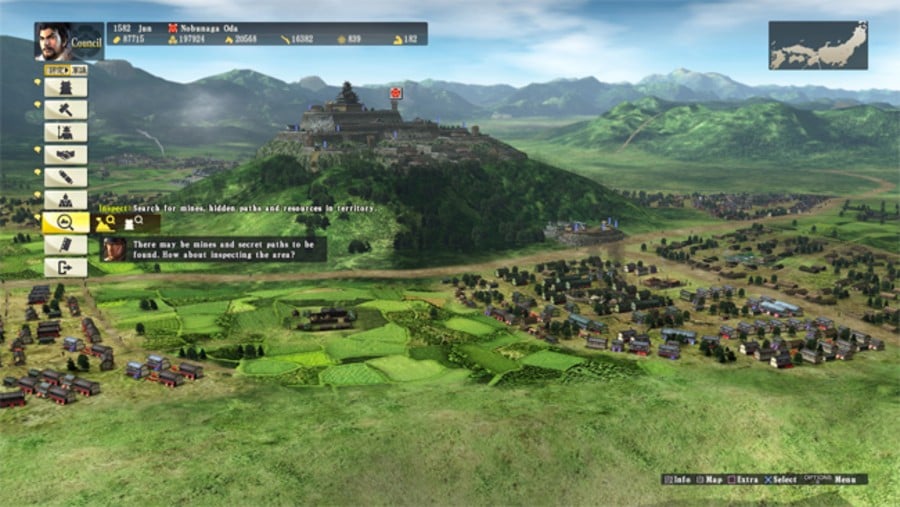
As mentioned, you must be expecting a lot of new players to try Nobunaga's Influence. Have you done anything to help welcome those newcomers? Are there easier difficulties, for example?
Yes, we are expecting a lot of new players, not only from the US and Europe, but given that there are 13 games that came before, there are a lot of players who have played one or two of the games but haven't played for a while, and we are trying to draw them all back with Sphere of Influence.
To make sure new players know what to do, there's a detailed tutorial that will guide the player step by step. The tutorial is much more detailed and bigger than in the other games that have come before, and there's also a kind of story mode. So, you have certain warlords, certain ministers aiding you, telling you the next step that you should do. New players should follow their lead to get to a certain point where they have certain strengths and can survive, and get the gist of the game.
Regarding the difficulties, we started out with three different difficulties, then we figured out that it's maybe not hard enough, so we added in a very hard fourth difficulty level. But on top of that, there's also detailed options of decreasing or increasing the difficulty, with settings like changing the power of your own troops and of your enemy's troops. If you're really stuck on the game, you can even alter these options during gameplay. So if you're stuck, don't know where to go, make your enemy a little weaker so you can keep enjoying the game.
In Sphere of Influence, you need to keep your own lands stable with politics and development while also conquering new ones, so there's quite a lot to manage. How difficult was it to get that balance of gameplay right?
Given the complexity of the game, and the high numbers of castles, different warlords, and characters you can play as of course makes it quite difficult to balance the gameplay. But we saw that as a benefit, because we try to be as realistic as possible, which leads to the fact that certain warlords and clans have an advantage over others.
So if you have a really rich country or you're a really strong warlord, of course you have an advantage over weaker warlords and smaller countries. Based on a historic view, it totally makes sense that the game is a little off balance, but obviously, you want to give players who want to play as weaker warlords a chance to also conquer the nation. Especially in Japan, you have all these players who want to play as their own state, their own historic warlord, due to where they live.
But overall, the complexity is a plus because if you're too weak to conquer someone, you still have the ability to form alliances through politics instead of fighting, and surviving this way. So in that sense, it wasn't too hard to balance the gameplay because you always have so many options to reach your goal.
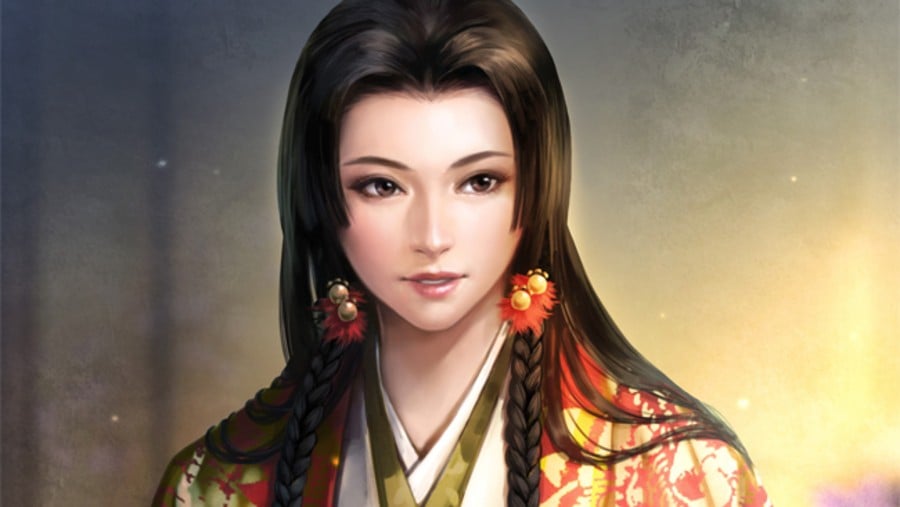
Koei Tecmo is well known for its other historical properties, namely Dynasty Warriors and Samurai Warriors. Why do you think developers are drawn back again and again to these historical scenarios?
From the beginning, Koei was doing historic scenario strategy games and it kind of grew on them. The users liked the historical strategy games, so the company kept doing it, attracting employees and developers who are interested in history and who would like to work on a historic scenario. This trend grew over the last 20 or 30 years, and it developed in a direction where history enthusiasts just came together on both the user side and the developer side.
Sphere of Influence is releasing on both the PlayStation 3 and the PlayStation 4. Are there any differences between the two versions, and has the improved PS4 hardware allowed for more freedom during development?
We have an engine that makes it easy to develop one game and set it out for different systems like PlayStation 3, PlayStation 4, Windows PC, and PS Vita. For Sphere of Influence, we started developing on PlayStation 4, and we started to downsize things like design and sound, but for the features, we wanted to develop the same game for the user no matter the platform. So, the differences are mainly in the visualisation, the sound, and the presentation of the game, with the PS4 being the basis and being the same level as a high end Windows PC. The PS3 is a little lower level.
As a matter of fact, the PS4 is far more widespread in the US and Europe than in Japan, because in Japan, more players are still playing on PS3. We had to keep in mind that the game itself has to be as good on PS3 as it is on PS4. If we were developing this game not for Japan but mainly for Europe and the US where many more players have already switched generation to PS4, we could have tried to use specific PS4 features and maybe improve the game, but we couldn't do that while keeping the Japanese market in mind. So, we're a little jealous of Europe and the US for the high rate of users switching to PS4.
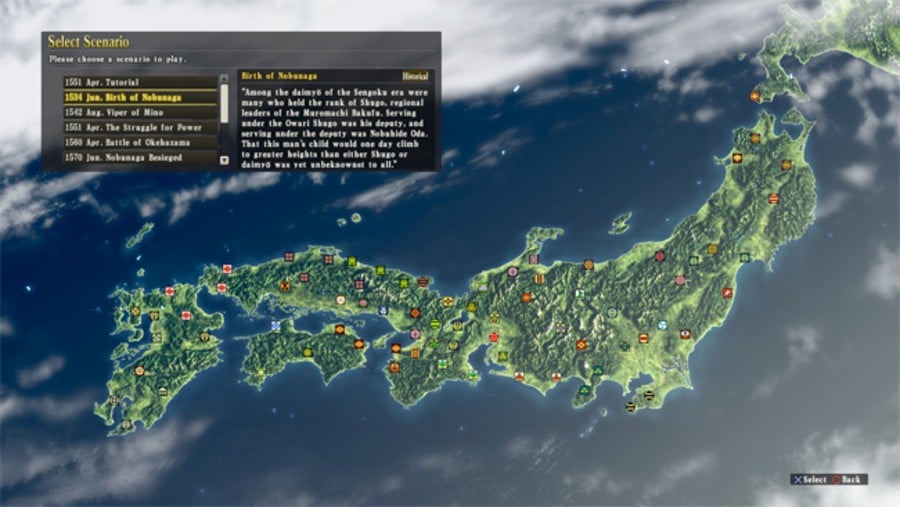
Koei Tecmo has a great record when it comes to localising games in recent times. How important do you think it is for Japanese games to maintain a presence in the Western market?
Catching up a little with the previous question, US and European users are more likely switching to the PS4, whereas Japanese players are not as eager to switch to the next generation of consoles – a lot of them are still playing on PS3. So from a business point of view, it doesn't make much sense to put too much effort into next-gen consoles as they're not as widespread in Japan. Therefore, if you want to keep being a major player in this high spec console market, you have to keep America and Europe in mind, because they're the users buying the PS4 and Xbox One games.
In this respect, the US and Europe are almost as important as the Japanese market for game development, so every time we develop a new game, we are keeping the Western territories in mind, and are trying to develop a game that's as good for the Western gamers as it is for Japanese gamers.
Different to other Japanese publishers who are developing games that will be accepted in Europe and the US, maybe better than they will be in Japan, Koei Tecmo is a publisher who is traditionally making games that are mainly for Japanese users, based on Japanese history, Chinese history, or Japanese anime, comics, or trends.
But we think that if we make a game that's good and is accepted and can be enjoyed by Japanese people, there will also be people in the West who will enjoy them and find them entertaining as well. We put a lot of effort into making good games and publishing them in the West, and hopefully we'll develop a growing fanbase for Koei Tecmo games in the West, too.
Are you looking forward to Nobunaga's Ambition: Sphere of Influence? Are you desperate to give your brain a bit of a strategic workout? Display your tactical knowledge in the comments section below.
[ Special thanks to Kenichi Ogawasara, our translator, Marilena Papacosta, and Koei Tecmo for making this interview possible ]





Comments 10
Hmm, looks interesting. If this is real-time then I might give it a try
I'll buy no matter what! I love the series!
I've played some of the RotTK games on PC and PS2 and I think this is basically the Samurai Warriors to RotTK's Dynasty Warriors so should be quite similar. Unless something goes very wrong with it, I should be buying it.
I sent them an email asking for this to be localised when it first hit Japan, I'm glad enough voices were heard to make a difference. Day 1.
I love strategy and everything that smells like Total war. Therefore I am so much hyped about this game, can t wait to put my hands on it
I own all the rottk's and Nobunaga's from ps1-ps2 era. I can't wait for this. I hope Koei brings back rottk and uncharted waters.
Just want to highlight this particular quote: "But we think that if we make a game that's good and is accepted and can be enjoyed by Japanese people, there will also be people in the West who will enjoy them and find them entertaining as well."
Refreshing to hear, especially when you have companies like Square Enix trying to Westernise some of its properties. I think one of the main reasons people like Japanese games is because, you know, they're Japanese. They tend to offer a different feel, a different tone, and that should always be welcome in gaming. .
@ShogunRok
Exactly.
Although some of these Japanese RPG's need to tone down the incredible grindy gameplay. I love me some JRPG's but sometimes it's take 2 steps- random battle, take 2 more steps- random battle, ughhh.
So smooth over and round a few corners but other than that, yes, I love Japanese games. Some of them anyways. The good ones
@ShogunRok that is exactly how I feel about it!
@ShogunRok "I think one of the main reasons people like Japanese games is because, you know, they're Japanese."
OMG!!! This is so beautiful, I just want to cry. You have no idea how frustrating it is to try and explain this to other gamers especially on the Xbone side. Which is sad, because there are a ton of Xbone gamers that also feel the same way and would love to be able to play more Japanese games on the system of their choice.
Leave A Comment
Hold on there, you need to login to post a comment...